Old Testament
Genesis Exodus Leviticus Numbers Deuteronomy Joshua Judges Ruth 1 Samuel 2 Samuel 1 Kings 2 Kings 1 Chronicles 2 Chronicles Ezra Nehemiah Esther Job Psalms Proverbs Ecclesiastes Song of Solomon Isaiah Jeremiah Lamentations Ezekiel Daniel Hosea Joel Amos Obadiah Jonah Micah Nahum Habakkuk Zephaniah Haggai Zechariah MalachiJob 7:16 Similar Verses
Job 7:16 Cross References
I loathe it; I would not live alway: let me alone; for my days are vanity.
Uncover the Rich Themes and Topics of This Bible Verse
Listed below are the Bible themes associated with Job 7:16. We invite you to explore each theme to gain deeper insights into the Scriptures.
Job 7:16 Cross Reference Verses
This section features a detailed cross-reference designed to enrich your understanding of the Scriptures. Below, you will find carefully selected verses that echo the themes and teachings related to Job 7:16 KJV. Click on any image to explore detailed analyses of related Bible verses and uncover deeper theological insights.
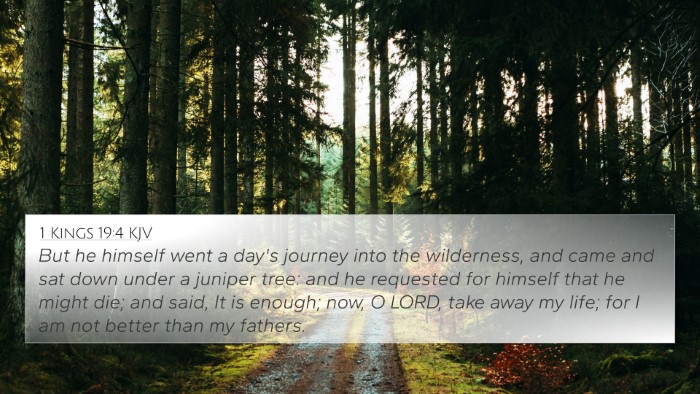
1 Kings 19:4 (KJV) »
But he himself went a day's journey into the wilderness, and came and sat down under a juniper tree: and he requested for himself that he might die; and said, It is enough; now, O LORD, take away my life; for I am not better than my fathers.
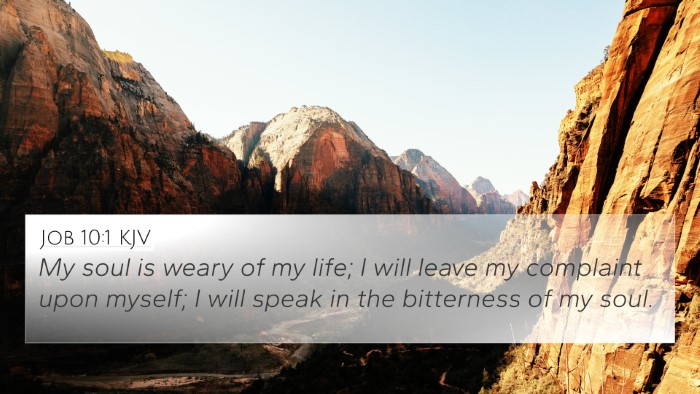
Job 10:1 (KJV) »
My soul is weary of my life; I will leave my complaint upon myself; I will speak in the bitterness of my soul.

Job 6:9 (KJV) »
Even that it would please God to destroy me; that he would let loose his hand, and cut me off!

Job 10:20 (KJV) »
Are not my days few? cease then, and let me alone, that I may take comfort a little,
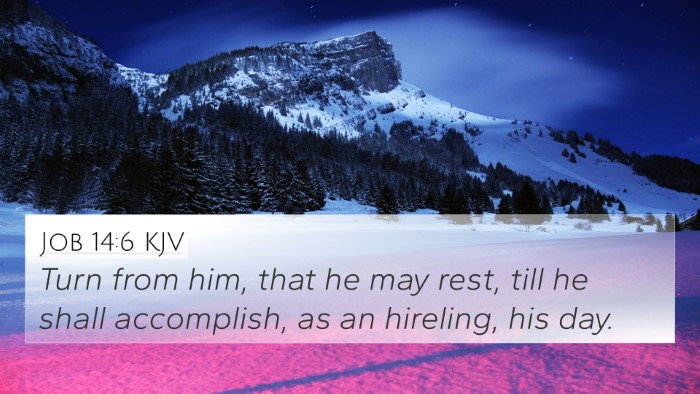
Job 14:6 (KJV) »
Turn from him, that he may rest, till he shall accomplish, as an hireling, his day.
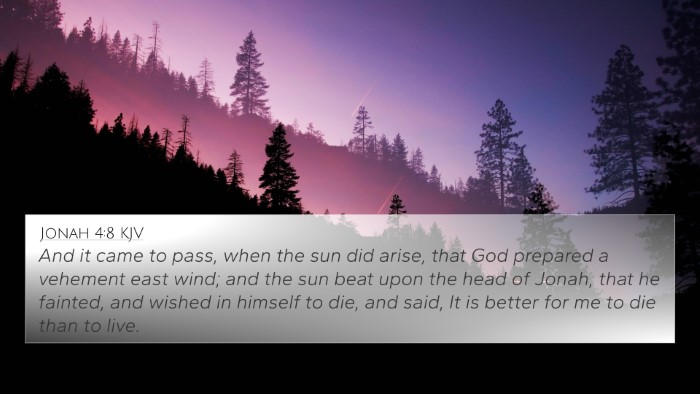
Jonah 4:8 (KJV) »
And it came to pass, when the sun did arise, that God prepared a vehement east wind; and the sun beat upon the head of Jonah, that he fainted, and wished in himself to die, and said, It is better for me to die than to live.

Genesis 27:46 (KJV) »
And Rebekah said to Isaac, I am weary of my life because of the daughters of Heth: if Jacob take a wife of the daughters of Heth, such as these which are of the daughters of the land, what good shall my life do me?

Psalms 62:9 (KJV) »
Surely men of low degree are vanity, and men of high degree are a lie: to be laid in the balance, they are altogether lighter than vanity.
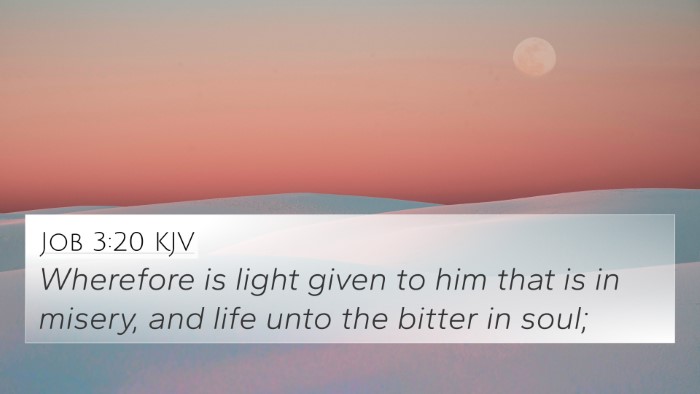
Job 3:20 (KJV) »
Wherefore is light given to him that is in misery, and life unto the bitter in soul;
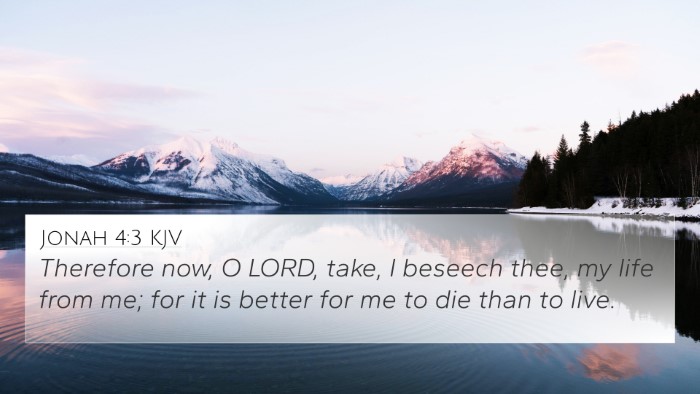
Jonah 4:3 (KJV) »
Therefore now, O LORD, take, I beseech thee, my life from me; for it is better for me to die than to live.
Job 7:16 Verse Analysis and Similar Verses
Understanding Job 7:16
In Job 7:16, Job expresses the profound despair and anguish that arises from his suffering. This verse encapsulates Job's feelings of worthlessness and emotional turmoil as he contemplates life amid his afflictions.
Verse Context
Job chapters 6 through 7 highlight Job's feelings as he grapples with his inexplicable suffering. In this particular verse, he conveys his wish to avoid life altogether, reflecting a moment of deep existential crisis.
Combined Insights from Public Domain Commentaries
- Matthew Henry: Matthew Henry emphasizes the desperation found in Job's plea, indicating that genuine anguish leads to questioning the value of life itself. He notes how Job reflects on his suffering and considers it a burden too heavy to bear.
- Albert Barnes: Albert Barnes points out the intensity of Job's emotions in this verse. He suggests that Job distances himself from life and the trials that come with it, underscoring the essence of human suffering and the desire for relief.
- Adam Clarke: Adam Clarke interprets Job's declaration as a moment of vulnerability, where he reveals his desire for connection with the divine amidst his sense of abandonment. Clarke emphasizes the psychological aspect of suffering and how it affects human relationships.
Thematic Connections
Job 7:16 resonates with several themes in the Scriptures, particularly those concerning suffering, despair, and divine silence. These themes reveal the struggle of the faithful in the face of adversity:
- Human suffering and the quest for understanding
- The struggle of faith amid trials
- God's silence in times of distress
Cross-References to Job 7:16
Job 7:16 relates to several other Bible verses that enhance our understanding of its message:
- Ecclesiastes 2:17: The Preacher expresses similar sentiments regarding the burdens of life and a desire to escape from it.
- Psalm 39:4-5: The Psalmist reflects on the brevity of life, echoing Job's sentiments about the meaning of existence.
- Psalm 13:1-2: This Psalm represents the feelings of despair and loneliness similar to Job's situation.
- Job 3:11-12: Job wishes he had never been born, showcasing parallels in his lamentation.
- Jeremiah 20:14-18: The prophet Jeremiah expresses similar feelings of wishing he had not been born due to his sufferings.
- Lamentations 3:1-20: The suffering and lamentation of the writer reflect Job's deep feelings of despair and abandonment.
- Romans 8:18: While Paul writes about suffering, he also emphasizes future glory, providing a contrast to Job's current despair.
- Matthew 26:38: Jesus experiences deep sorrow in the Garden of Gethsemane, relating to Job’s anguish.
- Isaiah 53:3: Prophetic writings regarding the suffering servant resonate with Job's experiences and feelings of rejection.
- 2 Corinthians 1:8-9: Paul shares about his own struggles and despair, which align with the themes in Job's narrative.
Exploring Connections Between Bible Verses
Cross-referencing helps readers to delve deeper into understanding Biblical texts. Studying Job 7:16 through the lens of related scriptures enhances comprehension:
- Scriptural Cross-Referencing: This method allows for a broader perspective on universal themes of suffering and piety.
- Inter-Biblical Dialogue: Connecting Job to Psalms and Ecclesiastes reveals a consistent narrative concerning human emotion and divine silence.
- Comparative Bible Verse Analysis: Looking at the overlaps and contrasts in these scriptures can facilitate a richer understanding of the Biblical perspective on suffering.
Tools for Further Study
For those seeking to engage in a deeper exploration of these connections, various resources can aid in cross-referencing:
- Bible Concordance
- Bible Cross-Reference Guide
- Comprehensive Bible Cross-Reference Materials
Conclusion
Job 7:16 serves as a poignant reminder of the depths of human despair and the longing for relief from suffering. The combined insights from commentators underscore the need for empathy and understanding towards those in anguish, as well as the search for divine purpose in moments of existential questioning. By cross-referencing Job's plea with other Biblical passages, readers can gain a deeper insight into the collective consciousness of faith in the face of trials and tribulations.








